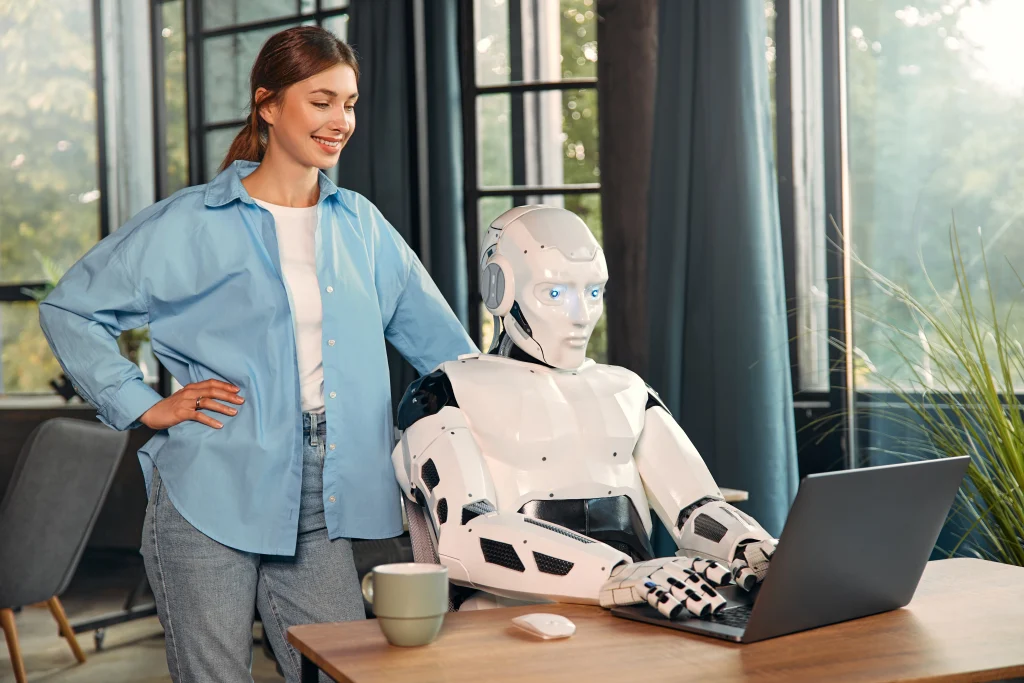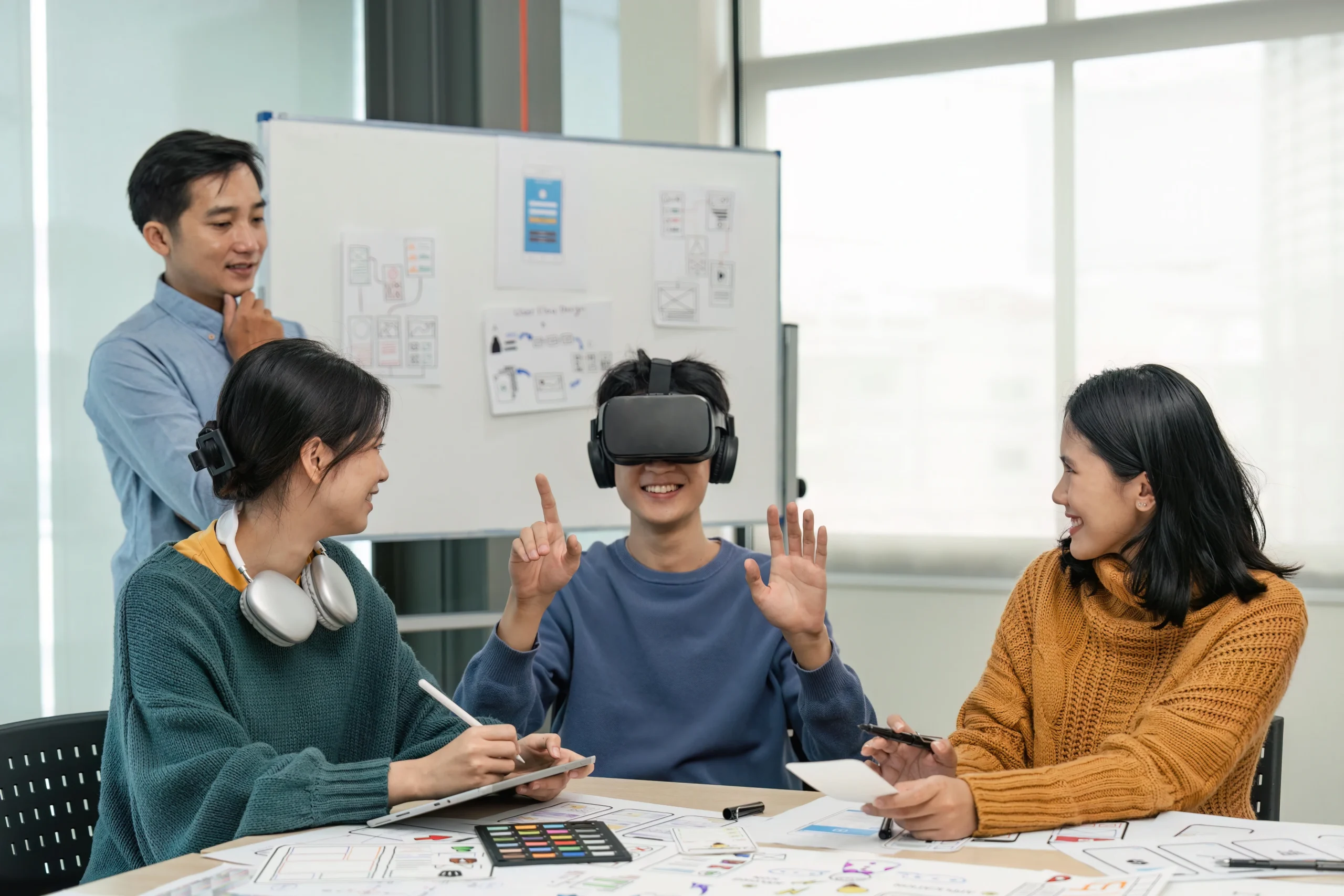AI in recruitment is redefining how companies find, assess, and hire talent globally.
Some AI tools help with resume screening and candidate matching. Others predict who’s likely to accept a job offer. AI chatbots answer candidate questions, schedule interviews, and keep things moving. The list goes on.
Today we’ll break down the most important ways Artificial Intelligence is changing recruitment. And how you can use it to enhance your hiring operations.
What Is AI for Recruitment?
AI in recruitment is about making hiring faster, sharper, and fairer. While it doesn’t replace recruiters. It takes the tedious work off so they can focus on what matters, finding the right people for your recruitment needs.
In short, here’s what AI can do:
- Sort resumes in seconds. It scans, ranks, and filters applicants based on job requirements.
- Match candidates to roles. AI looks at skills, not just job titles, to find the best fit.
- Analyze interviews. It picks up on speech patterns, confidence, and how well a candidate communicates.
- Predict performance. AI compares candidates to past hires and forecasts who’s likely to succeed.
- Reduce hiring bias. It anonymizes applications and ensures decisions are based on skill, not background.
- Spot hiring trends before they happen. AI helps recruiters plan instead of scrambling to fill roles.
73% of talent professionals say AI has changed how they hire.
The use of AI in recruitment
AI is no longer a futuristic concept in recruitment—it’s a standard tool. The best recruiters use AI to handle repetitive tasks, provide more in-depth insights, and improve decision-making.

1. Resume Screening: AI scans and ranks resumes in seconds
Resume screening has always been one of the most time-consuming parts of hiring.
Manually sorting through hundreds of applications takes hours, and human bias can lead to good candidates being overlooked.
AI-powered screening tools change this by handling the process in seconds. Using machine learning and Natural Language Processing (NLP), AI scans thousands of resumes. It identifies relevant skills and experience and then ranks candidates based on how well they match the job description. This helps select the best candidates.
73% of talent acquisition professionals say AI-driven screening has reduced their time-to-hire. Moreover, Applicant Tracking Systems (ATS) powered by AI now filter out up to 75% of resumes before a recruiter even sees them, automatically removing candidates who don’t meet the job requirements.
But AI isn’t perfect. It can sometimes reject strong candidates simply because they didn’t use the right keywords. That’s why recruiters still need to review AI’s choices instead of relying on them blindly.
2. Candidate Matching: AI suggests candidates based on skills, not just job titles
Traditional hiring has long emphasized job titles and experience as primary indicators of suitability.
AI, however, has introduced a shift toward a skills-based approach, allowing employers to identify candidates based on their abilities rather than the specific roles they have previously held.
This method broadens the talent pool, uncovering individuals whose qualifications may not align neatly with conventional job descriptions but who possess the necessary skills to excel.
By drawing on past hiring data, AI compares candidates to high-performing employees in similar roles, refining the selection process and improving hiring accuracy. This extends not only to external applicants but also to existing employees, enabling companies to identify internal talent for open positions.
In doing so, AI strengthens internal mobility, allowing businesses to develop and retain skilled workers rather than seeking outside hires for every vacancy.
Some hiring platforms have already integrated this approach, using AI to recommend candidates who may not have applied directly but whose skills suggest a strong fit for the role.
Companies that have adopted skill-based hiring report measurable benefits, with improved employee retention and a reduced likelihood of costly hiring mistakes.
Finally, as recruitment becomes increasingly data-driven, those who rely on AI’s ability to assess ability over credentials will find themselves at a distinct advantage.
3. AI Interviews: AI analyzes responses, tone, and facial expressions
AI-driven interviews have introduced a new layer of assessment beyond what is written on a candidate’s resume.
These tools evaluate both verbal and non-verbal cues, analyzing tone, confidence, and word choice to form a more complete picture of an applicant’s suitability. By applying standardized criteria, AI ensures a more objective evaluation, reducing the risk of interviewer bias and making hiring decisions more consistent.
In addition to refining candidate assessments, AI accelerates the interview process by providing instant feedback.
Recruiters no longer need to rely solely on intuition or lengthy deliberations—AI delivers insights that highlight critical strengths and potential concerns with greater accuracy.
Some studies suggest that AI-driven behavioral analysis can predict job performance with remarkable precision, further strengthening its role in modern hiring practices.
However, the use of AI in interviews raises ethical concerns. Automated assessments must be carefully managed to prevent unintended biases, particularly if the technology is trained on flawed data.
There are also privacy considerations, as candidates may be unaware of how their responses are being analyzed or stored. As AI in recruitment evolves, companies must balance its advantages with the need for fairness and transparency in privacy issues. Companies must ensure their AI tools comply with regulations and don’t reinforce biases.
4. AI Chatbots: AI answers questions, schedules interviews, and keeps candidates engaged
Candidate engagement plays a crucial role in the hiring process, and AI-powered chatbots have become an effective tool in maintaining communication with applicants.
These systems handle routine inquiries, providing immediate responses to questions about job roles, salaries, and company culture. By automating interview scheduling, they also reduce the administrative burden on recruiters, ensuring that qualified candidates move through the hiring process without unnecessary delays.
Beyond efficiency, AI chatbots help sustain applicant interest, guiding candidates from initial application to final interview and minimizing drop-off rates.
Companies that have adopted this technology report noticeable improvements, with higher response rates and a greater number of completed applications.
Some firms have seen a significant reduction in recruiter workload, as chatbots take over pre-screening and interview coordination, allowing hiring teams to focus on more strategic tasks.
For job seekers, the appeal is clear. Many candidates value prompt communication from potential employers, and AI ensures they receive timely updates rather than waiting days for a response.
At the bottom of things, AI in recruitment is a chance for companies to enhance the candidate experience and find themselves at an advantage. A chance to secure top talent before their competitors do.
5. Predictive Analytics: AI in recruitment forecasts hiring trends and helps recruiters plan ahead
AI is not limited to solving immediate hiring challenges—it also anticipates future workforce needs. Predictive analytics allows companies to identify talent shortages before they arise, giving employers the ability to plan rather than react.
By analyzing patterns in employee turnover, AI in recruitment helps businesses prepare for resignations and adjust hiring strategies accordingly. It also assesses candidate behavior to determine who is most likely to accept an offer, reducing the risk of losing top prospects to competitors.
The impact of predictive analytics is already evident. Many HR professionals report that AI-driven forecasting leads to more informed hiring decisions, minimizing guesswork and improving long-term workforce stability.
Companies that incorporate AI into workforce planning have seen a measurable reduction in hiring costs, as they can allocate resources more efficiently and avoid the expenses associated with rushed or reactive hiring.
Leading firms have already embraced this approach, using AI to anticipate recruitment needs months in advance. By doing so, they ensure that hiring remains proactive rather than dictated by urgency, securing the right talent before gaps emerge.
Companies like Amazon and Google use AI-driven workforce planning to anticipate hiring needs months in advance, allowing them to hire proactively instead of reactively.
6. Diversity Hiring: AI helps eliminate bias in hiring decisions
Unconscious bias has long influenced hiring decisions, often to the detriment of qualified candidates.
AI in recruitment offers a way to mitigate this issue by removing personal details from resumes, ensuring that applicants are assessed solely on their skills and experience rather than factors such as name, gender, or background.
It also detects biased language in job descriptions, suggesting neutral alternatives that make postings more inclusive and accessible to a broader range of candidates.
Besides resume screening, AI-driven assessments focus on a candidate’s abilities rather than subjective impressions, reducing reliance on human judgment alone.
Companies that have adopted these methods report a significant increase in the number of women and minority candidates advancing to later stages of the hiring process. Many recruiters also acknowledge that AI has helped them build more diverse talent pipelines, leading to stronger, more balanced workforces.
However, AI is not immune to bias. If trained on flawed data, it can reinforce the very disparities it was designed to eliminate.
So, to ensure fairness, companies must regularly audit their AI systems, refining algorithms to prevent unintended discrimination. While AI in recruitment can be a powerful tool for fostering diversity, its effectiveness ultimately depends on how carefully it is implemented.
What are the benefits of AI in recruitment?
AI is no longer a novelty in recruitment—it has become a fundamental tool. Rather than replacing recruiters, it refines their ability to assess candidates, eliminate inefficiencies, and make more deliberate hiring decisions.
In 2025, AI plays a central role in talent acquisition, altering how companies identify potential hires while minimizing the delays and misjudgments that often accompany traditional methods.
One of AI’s most immediate effects is in resume screening. Reviewing applications by hand is a slow and often imperfect process, subject to oversight and unconscious bias.
AI-driven systems process thousands of resumes in seconds, isolating relevant skills and ranking candidates accordingly.
Yet, as mentioned before, artificial intelligence is not without limitations. Strong applicants who fail to use the precise terminology AI recognizes may be unfairly dismissed, reinforcing the need for human oversight.
Beyond screening, AI has changed how candidates are matched to roles. Conventional hiring practices have long relied on job titles and experience as the primary indicators of suitability, but AI emphasizes a skills-based approach.
By assessing candidates based on competencies rather than credentials, AI identifies individuals who might otherwise be overlooked.
AI has also altered the nature of interviews. Automated tools now assess candidates in ways that extend beyond a written resume, evaluating speech patterns, confidence, and overall demeanor. These insights allow recruiters to conduct more impartial assessments.
Some studies suggest that AI-assisted evaluations yield more accurate predictions of job performance than traditional methods. However, this technology is not without controversy.
The use of AI to analyze interviews raises concerns about privacy and fairness. Particularly if the systems rely on flawed data or reinforce existing biases.
A survey conducted in October 2024 revealed that 43% of Americans feel uncomfortable with AI handling job interviews, with discomfort more pronounced among older generations.
Another shift AI has brought to recruitment is in candidate engagement. AI-powered systems now can handle preliminary interactions.
What this does is reduce administrative burdens and ensure consistent communication. Which prevents delays that might deter promising candidates.
Companies that incorporate AI-driven engagement strategies often find that applicants are more likely to complete the hiring process.
AI’s influence extends beyond immediate hiring needs, allowing companies to take a more calculated approach to workforce planning.
Predictive analytics can identify potential talent shortages, anticipate turnover, and assess which candidates are most likely to accept an offer.
Employers who use AI for these purposes have reduced hiring costs by making informed decisions well in advance. Leading firms already employ such methods to ensure they are prepared for shifts in workforce demand rather than reacting to them after the fact.
Diversity in hiring remains a challenge, and AI has been adopted as a means of addressing bias. By anonymizing resumes—removing names, gender, and other identifying details—AI ensures candidates are evaluated solely on their qualifications.
Additionally, AI detects language in job descriptions that may unintentionally exclude certain applicants and suggests neutral alternatives.
Companies that have embraced AI-driven screening practices report a marked increase in the number of women and minority candidates advancing through the hiring process.
The use of AI is becoming widespread – but its analysis of candidate videos or applications is “pseudoscience“.
One thing to consider when thinking about integrating AI into your hiring operations is that AI is not infallible; if trained on biased data, it can reinforce rather than correct disparities. For this reason, organizations must regularly review these systems to ensure fairness.
In the end, AI is more than a convenience—it is an indispensable asset in modern recruitment. Employers who integrate AI into their hiring strategies gain access to a wider, more qualified applicant pool, reduce inefficiencies, and make more calculated hiring decisions.
The companies that adapt will maintain an advantage, while those that ignore AI’s role in recruitment risk falling behind. In a hiring landscape that grows more competitive each year, AI is no longer optional—it is critical.
How Gini Talent uses AI in recruitment
Gini Talent uses AI to make hiring faster and more precise. At the heart of this approach is the Gini Talent Score (GTS), a unique metric that evaluates companies based on the educational backgrounds of their employees.
This data-driven method simplifies hiring and improves candidate selection. By leveraging AI, Gini Talent ensures businesses connect with the best professionals worldwide, making recruitment more efficient and effective.
Discover how Gini Talent leverages AI to revolutionize recruitment, for more info, fill out the form below and our experts will contact you shortly.



